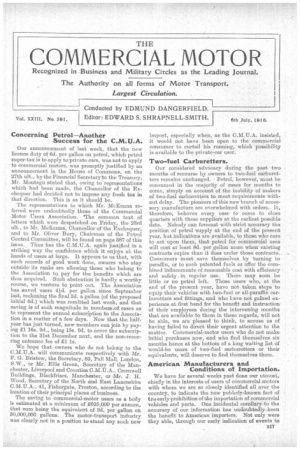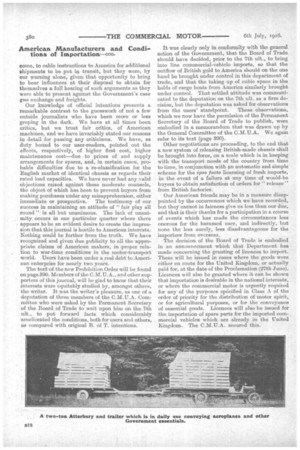Concerning Petrol—Another
Page 1

Page 2

If you've noticed an error in this article please click here to report it so we can fix it.
Success for the C.M.U.A.
Our announcement of last week, that the new licence duty of 6d. per gallon on petrol, which petrol super-tax is to apply to private cars, was not to apply to commercial motors, was promptly justified by an announcement in the House of Commons, on the 27th ult., by the Financial Secretary to the Treasury. Mr. Montagu stated that, owing to representations which had been made, the Chancellor of the Exchequer had decided not to impose any fresh tax in that direction. This is as it should be.
The representations to which Mr. McKenna referred were undoubtedly those of the Commercial Motor 1.Thers Association. 'The common text of letters which were despatched on Friday, the 23rd ult., to Mr. McKenna, Chancellor of the Exchequer, and to Mr. Oliver Bury, Chairman of the Petrol Control Committee, will be found on page 387 of this issue._ Thus has the C.M.U.A. again justified in a striking way the confidence which it enjoys at the hands of users at large. It appears to us that, with such records of good work done, owners who stay outside its ranks are allowing those who belong to the Association to pay for the benefits which are thus acquired. Such abstention is hardly a worthy course, we venture to point out. The Association has saved users 4id. per gallon since September last, reckoning the final 3d. a gallon (of the proposed initial 6d.) which was remitted last week, and that saving is of such magnitude in numbers ,of cases as to represent the annual subscription to the Association in a matter of a few days. Now that the halfyear has just turned, new members can join by paying £1 lfis. 9d., being 15s. 9d. to cover the subscription to the 31st December next, and the non-recurring entrance fee of £1 is.
We hope that owners who do not belong to the C.M.U.A. will communicate respectively with Mr. F. G. Bristow, the Secretary, 83, Pall Mall, London, S.W., or Mr. Ellis Green, Secretary of the Manchester, Liverpool and Counties C.M.U.A., Cromwell Buildings, Blackfriars, Manchester, or :Mr. J. H. Wood, Secretary of the North and East Lancashire C.M.U.A., 41, Fishergate, Preston, according to the location of their principal places of business.
The saving to commercial-motor users as a body is estimated at a minimum of £625,000 per annum, that sum being the equivalent of 3d. per gallon on 50,000,000 gallons. The motor-transport industry was clearly not in a position to stand any such new impost, especially when, as the C.M.U.A. insisted, it would not have been open to the commercial consumer to curtail his running, which possibility is available to the private-car user.
Two-fuel Carburetters.
• Our considered advocacy during the past two months of recourse by owners to two-fuel carburetters remains unchanged. Petrol, however, must be consumed in the majority of cases for months to come, simply on account of the inability of makers of two-fuel carburetters to meet requirements without delay. The pioneers of this new branch of accessory manufacture are overwhelmed with orders. It, therefore, behoves every user to come to close quarters with these suppliers at the earliest possible date. Nobody can forecast with strict 'accuracy the position of petrol supply at the end of the present year, but indications are available, to those who care to act upon them, that petrol for commercial uses will cost at least 8d. per gallon more when existing contracts expire than it does under those contracts.. Consumers must save thenaselves by turning to paraffin, or to such patented fuels as offer the combined inducements of reasonable cost with efficiency and safety in regular use. There may soon be little or no petrol left. Those users who, at the end of the present year, have not taken steps to equip their vehicles with two-fuel or all-paraffin carburetters and fittings, and who have not gained experience at first hand for the benefit and instruction of their employees during the intervening months that are available to them in these regards, will not be able, we are pleased to think, to accuse us of having failed, to direct their urgent attention to the matter. Commercial-motor users who do not make initial purchases now, end who find themselves six months hence at the bottom of a long waiting list of would-be users of two-fuel oarburetters or their equivalents, will deserve to find themselves there.
American Manufacturers and Conditions of Importation.
We have for several weeks past done our utmost, chiefly in the interests of users of commercial motors with whom we are so closely identified all over the country, to indicate the now pubhcly-known fact of the early prohibition of the importation of commercial vehicles and parts. One incidental corollary to the accuracy of our information has undoubtedly been the benefit to American importers. Not only were they able, through our early indication of events to come, to cable instructions to America for additional shipments to be put in transit, but they were, by our warning alone, given that opportunity to bring to bear influences at their disposal to obtain for themselves a full hearing of such arguments as they were able to present against the Government's ease qua exchange and freights.
Our knowledge of official intentions presents a remarkable contrast to the guesswork of not a few outside journalists who have been more or less groping in the dark. We have at all times been critics, but we trust fair critics, of American machines, and we have invariably stated our reasons in detail for passing any criticisms. We have, as duty bound to our user-readers, pointed out the effects, respectively, of higher first cost, higher maintenance cost—due to prices of and supply arrangements for spares, and, in certain cases, probable difficulties due to a re-classification for the English market of identical chassis as regards their rated load capacities. We have never had any valid objections_ raised against these moderate counsels, the object of which has been to prevent buyers from making purchases under any misapprehension, either immediate or prospective. The testimony of our success in maintaining an attitude of "fair play all round" is all but unanimous. The lack of unanimity occurs in one particular quarter where there appears to be an evident desire to create the impression that this journal is hostile to American interests. Nothing could be further from the truth. We have recognized and given due publicity to all the appropriate claims of American makers, in proper relation to war-time conditions in the motor-transport world. Users have been under a real debt to American enterprise for nearly two years.
The text of the new Prohibition Order will be found on page 390. Members of the C.M.U.A., and other supporters of this journal, will be glad to know that their interests were equitably studied by, amongst others, the writer. It was the writer's pleasure, as one of a deputation of three members of the C.M.U.A. Committee who were asked by the Permanent Secretary of the Board of Trade to wait upon him on the 7th ult., to put forward facts which considerably ameliorated the conditions, both for users and others, as compared with original B. of T. intentions. It was clearly only in conformity with the general action of the Government, that the Board of Trade should have decided, prior to the 7th ult., to bring into line commercial-vehicle imports, so that the outflow of British gold to America should on the one hand be brought under control in this department of trade, and that the taking up of cubic space in the holds of cargo boats from Anaerica similarly brought under control. That settled attitude was communicated to the deputation on the 7th ult. as a firm decision, but the deputation was asked for observations from the users' standpoint. These observations, which we now have the permission of the Permanent Secretary of the Board of Trade to publish, were embodied in a memorandum that was drawn up by the General Committee of the C.M.U.A. We again refer to its text (page 390).
Other negotiations are proceeding, to the end that a new system of releasing British-made chassis shall be brought into force, on a scale which is in keeping with the transport needs of the country from time to time, in conjunction with an automatic and simple scheme for the ipso facto licensing of fresh imports, in the event of a failure at any time of would-be buyers to obtain .satisfaction of orders for " release " from British factories.
Our American friends may be in a measure disappointed by the occurrences which we have recorded, but they cannot in fairness give us less than our due, and that is their thanks for a participation in a course of events which has made the circumstances less onerous for the harassed user, and. indirectly, but none the less surely, less disadvantageous for the importers from overseas.
The decision of the Board of Trade is embodied in an announcement which that Department has made concerning the granting of licences to import. These will be issued in cases where the goods were either en route for the United Kingdom, or actually paid for, at the date of the Proclamation (27th June). Licences will also be granted where it can be shown that importation is desirable in the national interests, or where the commercial motor is urgently required for any of the purposes specified in Class A of the order of priority for the distribution of motor spirit, or for agricultural purposes, or for the conveyance of essential goods. Licences will also be issued for the importation of spare parts for the imported corn-. mercial vehicles which are already in the United Kingdom. The C.M.U.A. secured this.




















